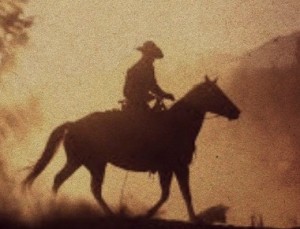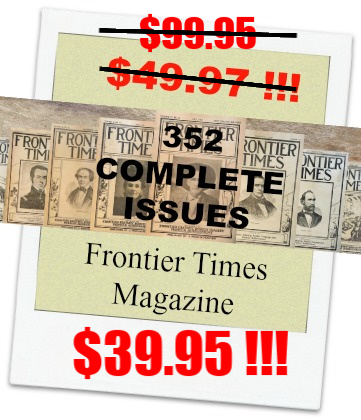By using our website, you agree to the use of cookies as described in our Cookie Policy
AN OLD TRAIL DRIVER TALKS ABOUT EARLY DAYS

By Cora Melton Cross
Wm. Simpson has been a resident of one county in Texas for forty-seven years and according to his idea, "there's no better place on God's green earth to spend the rest of the years he has to live than in Wise County."
Mr. Simpson has seen the transformation of town and country, the free grass range cut and fenced with wire into enormous pastures, they in turn cut into moderate sized stock farms, and in some few instances he has seen these develop into towns plats or additions to towns, that have since become cities, and which at that time were simply groups of three or four houses with one store, carrying general merchandise, one or two saloons, a blacksmith shop and some sort of a name tacked onto the whole to let folks know that it was supposed to be such and such a town. He is brimful of stories and experiences of pioneer days as seen and known by the Texas cattleman of that. time, and we are here giving some of these just as he told them.
"I think lots, as I grow older and older and new inventions are made to give us comfort and pleasure, and help, about the days of the old frontier. My ranch, now located in Wise County, where I went forty-seven years ago make my home, is modern in every way. Automobiles and trains are ready to take us to and from places. We sit at home on a rainy day,or freezing cold night and hear the stock reports, a good sermon, or a fine musical program on the radio. Our fields are plowed and harvested by machinery and our livestock are largely maintained that way. The stock farmer rides 'round his calttle or sheep in his car and the dairy business is carried on by trucks.
"I was a young fellow when I first started out to be a `cowman' and the height of my ambition then was to see my brand on every cow brute that I came across. I'll never forget my first visit to Fort Worth, or to the `Fort,' as it was then called. We came through it one cold, rainy day. There were a few log cabins set 'round in a square, with one larger one, the commissary, at the back side of them. All of them had port holes to shoot from. Outside of the Fort proper, there was a box room store or two, six or seven saloons, some of which had poles set up for rafters with buffalo or cowhides for the roof. The post office was there, which made the place unusually interesting, for getting mail was an important thing then. You see that has been a long time ago. We were driving one-horse team and a yoke of oxen that `geed and hawed' to the names of `Rock' and `Tony.' It got colder and colder all the way and the week before Christmas we landed in Wise county in a two foot snow, and camped in a little log school house till the cold spell broke up. Then we set out to find a place to live in for the balance of the winter. Houses were scarce as hen's teeth then, and we were lucky to chance on Ira Long, then captain of the Texas rangers, and a better man never lived than he. He let us move in his log smokehouse, and I've often thought since that no house has seemed finer nor better than did that little old log cabin that cold winter of '77.
"Capt. Long was an Indian fighter and he was also an Indian hunter, and the red devils sure did hide out unless they knew they outnumbered his men. If they did they would attack, but they had to be sure they had the corner on Long to do it; for they knew he was bad medicine'—that was what they called him. Talk about your stories, I wish you could have talked with him; he would have told you some real exciting things, not a yarn, but sure enough truth that was as thrilling as a movie.
"Well we decided to go the next spring to Decatur, and we did. It was a little camp, or town, as they called it then consisting of one store, which was in a one-room box house, two saloons, one of which had a barber shop in it, and a little frame courthouse, the only framed house in that part of the country.
"Yes, there were a few folks that had farms, or that was what they called them. They were about as big as my bandanna that I wore round my neck and grew, mostly, feedstuff for a couple of work horses and oxen, and some cabbage and onions and turnips also for the table, when blister bugs didn't get them first, as they most of the time did. We lived on dried fruit, frijoles and buffalo, antelope, deer and quail meat. And there was lots of all of it to be had for the killing.
ENJOYING THIS STORY?
"That was a sure-enough cattle country then, nothing but free grass everywhere and it took some riding to keep the cattle together, I tell you. One bunch of cowboys would ride in the day and another did guard at night. We had to ride the line, too, and the colder it was the harder we rode. You know `the line' was an imaginary range boundary and one set of ranch hands would ride until they met a bunch from another ranch and they would stop and eat and camp right there. That was the only way the cattle were kept, then, from drifting from the plains to the brakes of South Texas.
"I went up the trail several times, but the one that year was the worst and hardest of all my trailing trips. We took the cattle up the Ouachita River, somewhere near where Duncan, Okla, now is. Then, of course, it was all in the Indian Territory, and, believe me., Indian was right, too, I tell you. We had a stampede with those cattle pretty nearly every single night we were out, and it rained, hailed and snowed and worst of all it tried itself doing the lightning stunt. Talk about being scared, I tell you when that lightning got to playing 'round on the horns of those cattle we were naturally the best bunch of cowboys that ever rounded up a herd of cattle. And then when the sun came out next day we were the out-cussingest bunch the Lord ever let live, I reckon.
"I remember one night I was on guard and it was storming and the cattle kept milling 'round, just ready to run at the drop of a hat; and right then she dropped from somewhere. We never did know what it was that scared those cattle, but they were just scared to death and they rode plum over me. That is, I had to drift like a house afire to keep them from killing me. Talk about your movies, there never was a picture that was as exciting as a cattle stampede on a rainy night. And that night after we got them to circling, which is the only cure for a stampeded herd, we, every one of us sang to them till we were so hoarse we couldn't speak next morning better than a whisper. That stampede business lasted all the way up the trail and I surely got enough of it.
"Sleep? Why I got so I could sleep anywhere any time; just give me a chance to sleep and 1 was right there. I have slept in a puddle of water under a little bunch of catclaw brush, with nothing but my saddle blanket under me and my sicker for cover and never woke up until the cook yelled 'come and get it' at breakfast next morning.
"But those were good old times, all right, and I don't know whether we are any happier with all the new changes. One thing I do know, we sure have lost that old way of asking a fellow to stay as long as he wanted to without money and without price, as the preacher says, that we had then. Why it wasn't anything to leave your ranch house in the morning and come home that night and see where some fellow had been there and had eaten up all the cold grub and maybe cooked himself a passle more and eaten that. But we never thought anything about it, only just wondered who it was. It would have made us mad as a nest of hornets if a man had offered to pay for anything he ate, or for staying all night in those days. Yep, we have lost a lot of good habits and customs along with some of the inconveniences and hardships; and I sort of have my doubts whether the present conditions will develop as steady, reliable, dependable men as was done then. But automobiles and airplanes and trains and cables and telegraphs and radios and tractors and trucks and all those things are mighty fine to have and I'm glad I have lived to see them. But all the same the frontier days were hard to beat."
HOW ABOUT 20,000 MORE PAGES OF STORIES JUST LIKE THIS ONE?
EYE-WITNESS -- FIRST-HAND -- RAW, GRITTY, TRUE TEXAS HISTORY

352 issues, instant download - Normally $99.95
Now $39.97 for a limited time!
Click HERE
‹ Back




